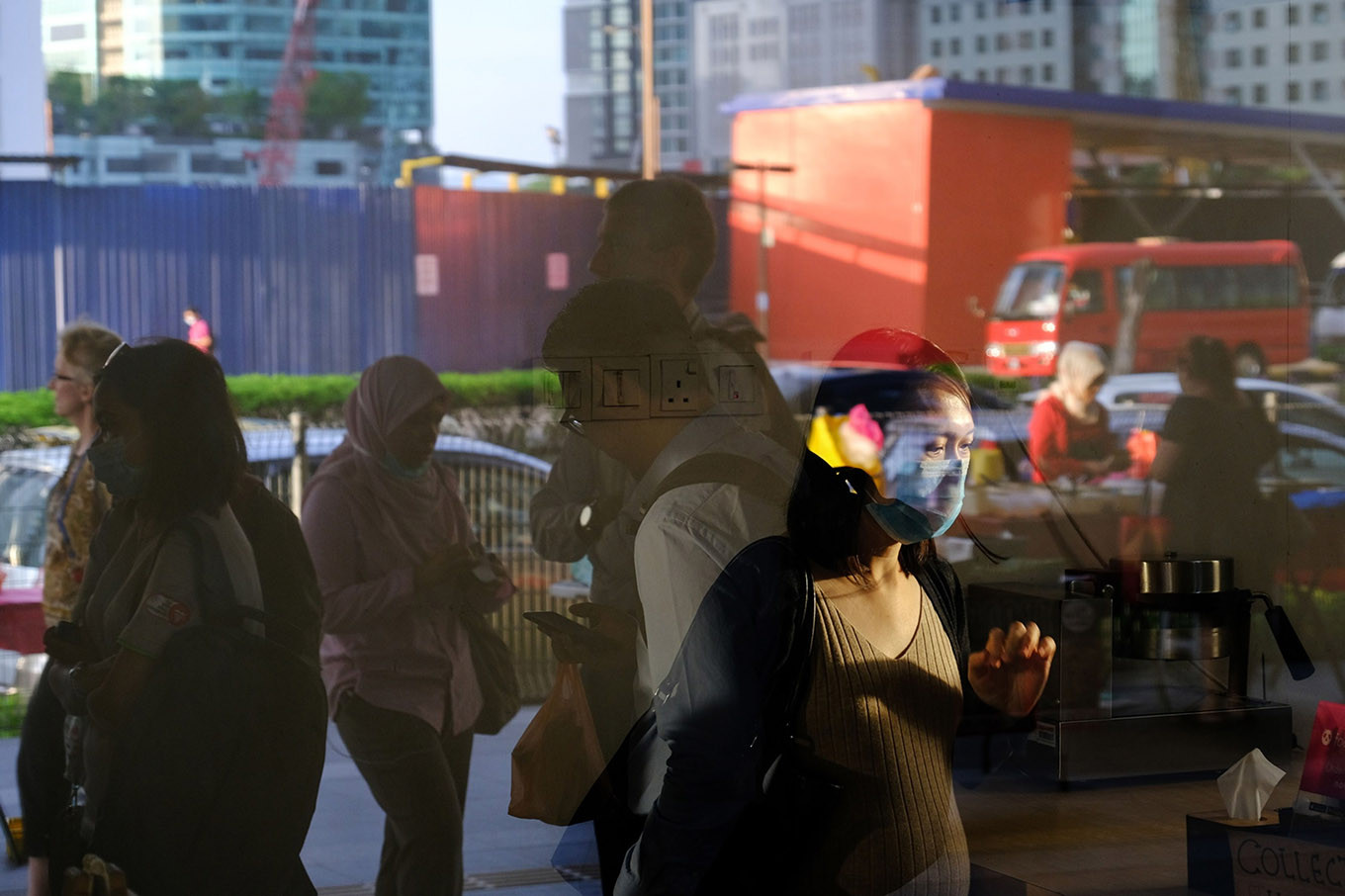Popular Reads
Top Results
Can't find what you're looking for?
View all search resultsPopular Reads
Top Results
Can't find what you're looking for?
View all search resultsSingapore faces bigger contraction as Malaysia shuts borders
Maybank Kim Eng Research Pte. estimates that about 400,000 Malaysians working and studying in Singapore cross the border on a daily basis.
Change text size
Gift Premium Articles
to Anyone
 A person wearing a protective mask purchases food from a cafe inside Ampang Park station, operated by Rapid Rail Sdn Bhd., in Kuala Lumpur, Malaysia, on Tuesday, March 17, 2020. Malaysia is restricting people's movement nationwide to limit the spread of the coronavirus. The country is banning all visitors, and residents are barred from traveling overseas while places of worship, schools and business premises will be shut except for markets that supply daily needs, Prime Minister Muhyiddin Yassin said in a televised address late Monday. (Bloomberg/Samsul Said)
A person wearing a protective mask purchases food from a cafe inside Ampang Park station, operated by Rapid Rail Sdn Bhd., in Kuala Lumpur, Malaysia, on Tuesday, March 17, 2020. Malaysia is restricting people's movement nationwide to limit the spread of the coronavirus. The country is banning all visitors, and residents are barred from traveling overseas while places of worship, schools and business premises will be shut except for markets that supply daily needs, Prime Minister Muhyiddin Yassin said in a televised address late Monday. (Bloomberg/Samsul Said)
Malaysia’s lockdown is the latest threat to a Singapore economy already reeling from the coronavirus outbreak.
The city state relies heavily on its neighbor’s workers and food, and Malaysia’s move Monday night to ban all visitors and prevent residents from traveling overseas for about two weeks will choke off a key labor channel.
Maybank Kim Eng Research Pte. estimates that about 400,000 Malaysians working and studying in Singapore cross the border on a daily basis. The potential hit to the city state’s economy could therefore be large.
“Banning daily commuters will essentially cut off almost a 10th of Singapore’s labor force, hurting both the manufacturing and services industries,” said Chua Hak Bin, a senior economist at Maybank in Singapore.
Read also: Malaysia restricts travel, shuts schools and businesses to combat coronavirus
Singapore was already facing a recession because of virus-related disruptions to the city’s trade and tourism. Maybank was estimating a 0.3 percent contraction in gross domestic product in 2020, with the potential for a more severe decline if the Malaysia shutdown takes a heavier toll on the economy.
“Malaysia and Singapore remain joined at the hip by geography and history,” Chua said. “Malaysia’s lockdown, especially on travel and non-essential business, could have severe knock-on effects on Singapore’s economy.”
The cut-off also threatens to pummel food supplies in Singapore, which relies on Malaysia for a substantial volume of fruits and vegetables. Singapore officials moved Monday to reassure citizens the city won’t run out of food and supplies as consumers rushed out to stack up on groceries.
“Although it’s unexpected and unprecedented, I guess we’ll just have to wait and assess given it’s only for two weeks,” and there should be sufficient inventories of food to cover that period, Selena Ling, head of research and strategy at Oversea-Chinese Banking Corporation Ltd. in Singapore, said in an email.
Ling said she’s forecasting a 0.9 percent year-on-year contraction for Singapore’s first-quarter GDP growth, “but the risk is that it drags into the second quarter as well.”
While Singapore’s officials were credited with a swift, clear, and effective response in the early stages of the outbreak, the global spread of the virus has brought a new wave of challenges to the small and open city state. The number of infections has spiked in recent days, with new cases mainly from overseas arrivals to the country.
Read also: Three Indonesians who attended mass prayer in Malaysia test positive for COVID-19
The latest economic data doesn’t yet show the pain of the virus outbreak. Non-oil domestic exports expanded 3 percent in February from a year earlier, including a 2.5 percent gain in electronics shipments, according to data published Tuesday.
Port data for February showed that Singapore container throughput was humming along, if not booming, at an above-average rate compared with long-term norms.
Before the virus outbreak set in, Singapore was poised for a modest rebound following the worst growth performance in a decade in 2019. The government last month reduced its forecasts for 2020 economic growth to a midpoint of 0.5 percent, from 1.5 percent.









